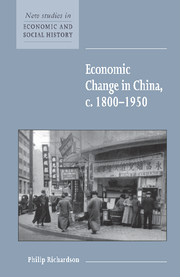Book contents
- Frontmatter
- Contents
- List of maps
- Acknowledgements
- Note on references
- Guide to pronunciation
- Dynastic chronology
- Weights and measures
- Map 1: China: provinces and cities
- Introduction
- 1 Analytical frameworks
- 2 The eighteenth-century legacy and the early nineteenth-century crisis
- 3 Growth and structural change
- 4 Foreign trade and investment
- 5 Industry: traditional and modern
- 6 Agriculture
- 7 The state and the economy
- 8 Conclusion: the legacy of the past
- Bibliography
- Index
- New Studies in Economic and Social History
- Previously published as Studies in Economic and Social History
- Economic History Society
1 - Analytical frameworks
Published online by Cambridge University Press: 05 June 2012
- Frontmatter
- Contents
- List of maps
- Acknowledgements
- Note on references
- Guide to pronunciation
- Dynastic chronology
- Weights and measures
- Map 1: China: provinces and cities
- Introduction
- 1 Analytical frameworks
- 2 The eighteenth-century legacy and the early nineteenth-century crisis
- 3 Growth and structural change
- 4 Foreign trade and investment
- 5 Industry: traditional and modern
- 6 Agriculture
- 7 The state and the economy
- 8 Conclusion: the legacy of the past
- Bibliography
- Index
- New Studies in Economic and Social History
- Previously published as Studies in Economic and Social History
- Economic History Society
Summary
The analysis of the emergence of modern economic development in China has centred on four issues: the categorisation of the overall experience within the spectrum from decline through stagnation to growth and development; the extent of the foreign involvement and the nature of its relationship to the domestic economy; the complex interaction of forces which determined the dynamics of change in the increasingly labour-abundant land-scarce rural economy; and the role of the state.
The debate has progressed through a symbiotic interplay between the formulation of a series of theoretical constructs and the presentation of a widening body of empirical data. As methodological weaknesses in the constructs have been revealed, as the empirical perspective has changed and as the ideological and political parameters have fluctuated, new approaches have opened up, new priorities have emerged and the enquiry has moved on.
Analytical development, however, has not altogether brought resolution. There is still no firm consensus on how the overall historical growth trajectory should be characterised, on the significance of the foreign influence, or on the explanations for change in the rural sector. Moreover, there are doubts about whether the various individual conceptual frameworks can adequately explain the main features of China's economic history as they are perceived and, perhaps most seriously, there are question marks over the validity of some of the assumptions which underwrite those frameworks. For one leading writer in the late 1980s, the existing constructs had not provided, and could not provide, a persuasive explanation.
- Type
- Chapter
- Information
- Economic Change in China, c.1800–1950 , pp. 6 - 15Publisher: Cambridge University PressPrint publication year: 1999

